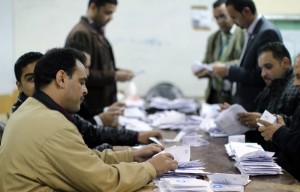
(AFP Photo)
The Supreme Constitutional Court (SCC) postponed Wednesday its final verdict regarding lawsuits claiming the unconstitutionality of the parliamentary elections law to Sunday, according to State TV.
Last week, a commission of SCC-affiliated senior judges approved several lawsuits demanding the annulment of parliamentary laws due to unconstitutional content, turning the fate of the parliamentary elections upside down.
The government passed three political laws: the law defining political rights issued ahead of the presidential elections last May, and the law organising the establishment of the parliament, which were passed by former interim president Adly Mansour.
Mansour, who is also the president of the SCC, could not as a result look into lawsuits appealing on the constitutionality of those laws, and was replaced by one of his deputies.
The third law is the source of the elections’ delay. It was issued by President Abdel Fattah Al-Sisi last December, and includes two sections, each dividing the country into electoral constituencies, according to the two voting systems available: the closed list and the individual list.
The laws were mainly contested on claims that they violated constitutional guarantees for equal and fair representation. These include the allocation of parliamentary seats to each electoral constituency, and the expenses allowed for electoral campaigns, which are set to a maximum of EGP 500,000.
Political elections are managed by the independent committee, the Supreme Electoral Commission (SEC). The SEC had opened doors for the parliamentary procedures to begin earlier in January, announcing that the elections will start in March. It began by allowing NGOs and media to register for the monitoring and coverage of the elections.
Candidates were supposed to apply at the SEC between 8 and 17 February, but according to an inside source from the commission, a complication occurred, causing slight amendments to the original schedule.
“The court required parliamentary candidates to pass a medical test for the first time, and there was a lack of proper coordination between SEC and the Ministry of Health on the matter,” the source, who requested anonymity, had told Daily News Egypt.
On 19 February, the SEC closed the doors for applications and published Tuesday the names of over 5,000 candidates and the districts they wish to run for. Those names are subject to change within the following week, because there could be appeals before the court regarding the eligibility any of the candidates.
Last October, politicians and parties were asked to submit to the cabinet their draft versions of the parliamentary law dividing the country into different constituencies. These would be represented inside the parliament by one or more candidates, depending on the legal division accepted.
As the President of the Al-Geel Democratic Party Nagy El-Shehaby, a parliamentary candidate for the Mahalla constituency, explained at the time that policy makers failed to include political forces in the decision-making process.
El-Shehaby had expected the law to ignore politicians and to be issued with constitutional defects.
“The government might want to pass a flawed law to keep the doors open for the possible postponement of the elections,” El-Shehaby stated.
According to the roadmap declared following the removal of former president Mohamed Morsi, parliamentary elections were supposed to take place before presidential elections. But in January 2014, Mansour announced an amendment in the order of elections, with Al-Sisi inaugurated in June.
This came after politicians reacted angrily to the passing of the law organising parliamentary elections last June. According to statements by Chairman of the liberal Al-Wafd Party El-Sayed El-Badawy during a roundtable discussion regarding elections, the political laws of 2014 were problematic because they were written by legal experts who have no background in politics.

